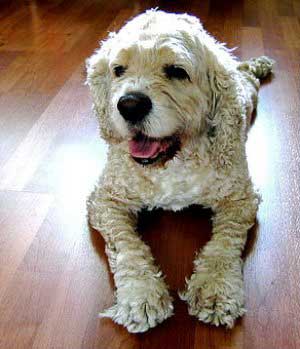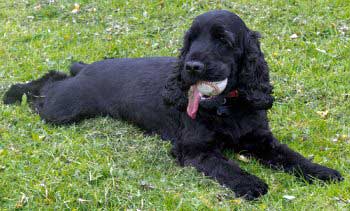- Home
- Cocker Spaniel Health Issues
- Anal sacs
Anal Sacs: All About Your Dog's Anal Glands
Your dog's anal sacs may become impacted from time to time, and it may be necessary for you to give your Cocker Spaniel a helping hand to clear them.
Learn more about your dog's anal glands to help you understand what they are, what they do, and how to keep them healthy!
What Are Anal Sacs?
Okay, so what exactly are they, where are they, and what are they used for?
These sacs (also known as anal glands) are two small scent glands inside your pet's bottom, just below and to either side of the anal opening.
 My anal sacs are fine, thank you! Nothing to see here!
My anal sacs are fine, thank you! Nothing to see here!These scent glands produce a green/brownish, foul, fishy smelling substance.
It's all perfectly normal!
When things are working well, and if your dog's poop is solid enough, it will press against the glands as he poops. This pressure releases a small secretion; just enough to coat your dog's poop.
The whole purpose of this secretion is to give information to other other dogs.
Just by sniffing, your Cocker will be able to tell what sex the owner of the scent is, if female, whether or not she's in season, approximate age, and how long ago they passed by. Pretty powerful stuff, eh?
As we know, dogs will often greet each other with a rather endearing display of butt sniffing.
What they're actually doing here is gathering
information about each other, and although we may find it particularly unpleasant and highly impolite, dogs don't, they're simply socializing and gathering information.
How Your Dog's Anal Sacs Become Impacted
As we now know, a normal healthy poop will produce enough pressure on the anal glands to release a small amount of this very smelly fluid onto your dog's poop.
This action is usually enough to empty your dog's glands naturally and unaided. We never notice the smell or see evidence of the secretion.
However, if your Cocker's poop is too soft, and/or he often suffers from diarrhoea, there won't be any pressure to help expel the substance from glands.
When this happens, a build-up can occur and if it's not expressed it can thicken and block the anal duct, resulting in your dog's anal glands becoming impacted.
If the problem isn't treated, it could lead to infection and extremely painful abscesses.
Note: If your often Cocker suffers from diarrhoea, you'd be well-advised to take a trip to the vets to have him checked over. Play it safe!
When Anal Sacs Become Impacted...
I'm sure that at some point you will have seen either your dog or another, dragging his bottom across the floor.
This is called scooting and they do this to ease the discomfort.
Either something is stuck there (with my Cocker, it's usually a blade of grass! Thankfully, his glands are healthy) or the dog has problems with his anal sacs.
If you've seen this unusual 'floor display', you've probably witnessed one of the most common symptoms of impacted anal glands.
In addition to your dog scooting across the floor, you won't be able to miss the smell emanating from his rear end and he may be leaving dark brown smears on the furniture where he's been sitting.
It's time to check him for signs of impacted anal glands.
If the area around the anal glands feels hard, like a marble, or is slightly swollen and pink, it could be an early sign of impaction and the glands should be cleaned and expressed immediately to empty them.
Expressing your dog's anal glands isn't difficult and if you're not squeamish, you could do this yourself, but if you prefer, your groomer or your vet could do it for you.
Although impacted anal sacs won't affect the overall health of your Cocker Spaniel, he could easily injure himself when dragging his bottom over the ground, which could lead to infection, so it's best to keep them clean and clear.
How To Spot The Signs Of Infected Anal Sacs
If your dog's anal glands do become infected, there's the danger he'll develop an abscess. If this happens, his bottom will become very swollen, a reddish-purple in colour.
Pus will have developed in the glands.
 So Mum, what the heck are anal glands?
So Mum, what the heck are anal glands?If it gets to this stage, it's likely that your Cocker Spaniel will be in a lot of pain.
It will become difficult for him to walk normally. He may hunch his body, (bottom tucked in and under) and he will probably continue to scrape his bottom along the ground in a bid for relief, but it will probably only make matters worse.
You may also notice your Cocker Spaniel licking his bottom, (More than usual? I hear you ask!). He's trying to relieve his pain and discomfort.
If you notice any of the above signs or the rank smell, take him to see his vet. If your dog does have an abscess, the vet will lance it and may prescribe a course of antibiotics to help clear up the infection and nurse him back to normal health.
Don't try to treat infected anal glands yourself.
Treating Problems With Anal Sacs
If your pet has an occasional problem with impacted anal sacs, it can be dealt with as and when it happens by carefully expressing them.
In addition, your vet may suggest a diet with increased fibre to help bulk up your dog's poop to enable sufficient pressure to be placed upon the anal glands so that they express and empty naturally.
However, if your pet continually suffers from gland problems your vet may eventually decide to recommend surgical removal.
Don't worry, this is usually a last resort.
However, if it is necessary, it's a fairly straightforward operation which will get rid of the problem of impacted anal glands for life, saving your dog from unnecessary pain and discomfort.
Best of all, there'll be no more fishy smell to put up with!
Anal Sacs: Summary
I hope the information given here has been helpful, and that you now have a better understanding of your dog's anal sacs, what can go wrong with them and how to deal with the problem when and if it arises.
If you need to express your dog's anal glands, this article will be all you need. It also includes a video to show you how it's done!
Please
note however, that the advice given is never intended to replace that of your vet's,
and if you have any concerns about your dog's health I strongly
recommend you speak to your vet.


